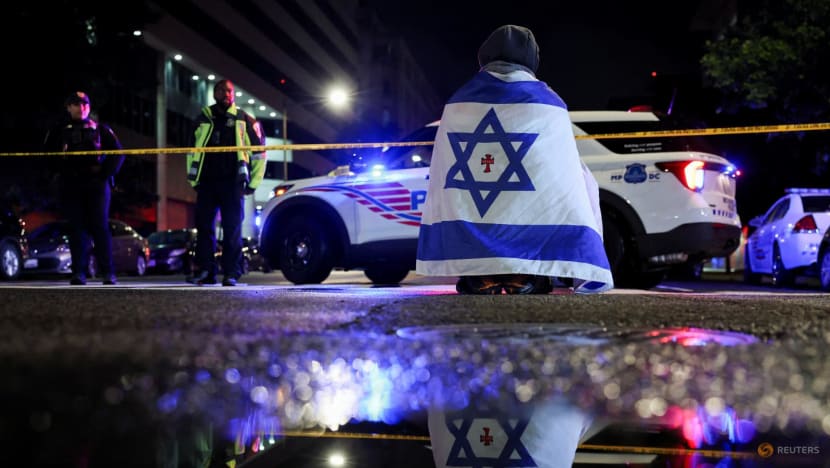Commentary: Israeli embassy staff killings expose the limits of diplomatic protection
The killing of two Israeli embassy staffers reveals the increased risks diplomats take especially as online radicalisation adds a new dimension to the threat, says political analyst Nina Markovic Khaze.

A man looks on next to police officers working at the site where two Israeli embassy staff were shot dead near the Capital Jewish Museum in Washington, May 21, 2025. (Photo: Reuters/Jonathan Ernst)
SYDNEY: The brutal killing of two embassy staff from the Israeli mission in the heart of Washington DC is a chilling marker of the dangers in an age of lone-wolf terrorism and transnational radicalisation.
Diplomats have long known the risk that comes with being posted abroad. But the shock is magnified when the danger strikes unexpectedly in a well-resourced nation.
I had the privilege of meeting hundreds of foreign diplomats in Canberra when representing an Australian parliamentary department. One moment has always stayed with me. Years ago, I went out for dinner with a friend from the Israeli embassy.
When we returned to her car – a nondescript, unmarked vehicle – I watched her crouch down and carefully inspect underneath it with quiet precision. “What are you doing?” I asked, still new to the world of diplomacy. She looked up and said, almost casually, “We are always at risk. Extremism never sleeps.”
Her words struck me then and have never left me. I’ve often recalled that moment, especially years later when I became a lecturer in diplomatic and security studies at Macquarie University, designing postgraduate courses to prepare the next generation of international affairs professionals.
It reminded me that behind the protocols and treaties are real people, living with daily risks that most of us rarely consider.
THE LIMITS OF INTERNATIONAL LAW
The FBI and Israeli officials quickly described the fatal shooting this week outside the Capital Jewish Museum as an act of terrorism.
The suspect was alleged to have chanted slogans in support of Palestinians in the context of the ongoing Israeli-Palestinian conflict and has since been charged with murder.
While the investigation into his motivations and subsequent court proceedings will take months to unfold, it appears part of a troubling trend across decades: the globalisation of hatred, accelerated by digital media and amplified by conflict zones far from the site of the violence.
The normalisation of hate speech and the proliferation of extremist ideologies online amplify these risks.
This can make the task of protecting diplomatic personnel even more challenging. Some dangers are addressed by erecting fortifications around embassy premises, as occurred in the aftermath of attacks such as that on the Australian mission in Jakarta. But diplomats and embassy staff are expected to mingle with the community in which they are posted.
The threat is insidious and can be difficult to police or disrupt when the root of violence stems from online echo chambers or other means of radicalism. The 2016 killing of Russia’s ambassador to Türkiye was carried out by a man shouting about the Syrian war.
The Vienna Convention on Diplomatic Relations (1961) remains the cornerstone of international law on diplomatic protection, enshrining obligations on host nations to safeguard foreign envoys and missions. Articles 22 and 29 clearly articulate the duty to protect diplomatic personnel and their premises from harm.
But what constitutes “appropriate steps” required under the convention? Is it foreseeable that a mob in India would storm a Bangladeshi consulate, having been stirred to violence by nationalist ranting in an increasingly febrile media environment, as occurred last December?
The Convention was written in a different era, in anticipation of threats largely emanating from state actors, state-sponsored terrorism, or organised groups. The reticence by Australia to return its ambassador to Ukraine following the Russian invasion offers an example of the type of traditional threat the convention sought to mitigate.
But the risk of individuals radicalised online adds a different dimension, a threat that can arise independently, swiftly and unpredictably. Security agencies have been grappling with this as a danger to the wider community, with the Washington attack serving as an awful reminder that the challenge extends to protecting diplomats and embassy staff, too.
LEARNING FROM PAST EXPERIENCE
Distance from the world’s geopolitical fault lines offers scant protection. Australia has experienced its own tragic history of politically motivated violence targeting diplomats.
In December 1980, the Turkish Consul-General was assassinated alongside his bodyguard in Sydney by suspected members of an Armenian militant group, in what became Australia’s first known political assassination of a foreign official – one for which the perpetrators have never been found.
Earlier Cold War-era attacks targeted Yugoslav diplomatic missions, including a 1972 bombing of the Yugoslav Trade Centre in Sydney, highlighting the violent spillover of diaspora nationalism into host countries.
In the aftermath of the 9/11 attacks in the United States, a man was charged in Perth for plotting to bomb Israeli buildings in Australia.
What, then, must governments do better?
Intelligence sharing is crucial. Diplomats are often soft targets. But agencies, while improving domestic arrangements, will naturally be less inclined to share information with rivals. No intelligence system will be perfect, no security measures infallible.
Whether the Vienna Convention – unchanged since 1961 – needs modernising to meet the challenges of the digital age should be discussed. This ties to broader legislative debates about enhanced coordination on cyber-monitoring of extremist threats and the role for the tech companies themselves in the policing of their platforms.
Public and institutional resilience are critical. Protecting diplomats isn’t merely about fences or bodyguards – it is about building a culture that respects the sanctity of diplomacy and rejects ideological violence in all its forms.
Extremism never sleeps. Our response, too, must be tireless.
Dr Nina Markovic Khaze is sessional lecturer at the Department of Security Studies and Criminology, Macquarie University. This commentary first appeared on Lowy Institute’s blog, The Interpreter.














